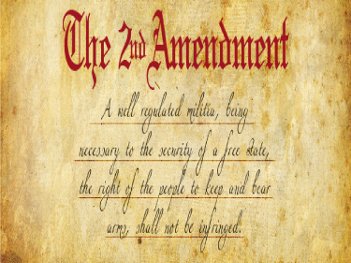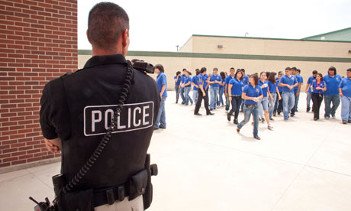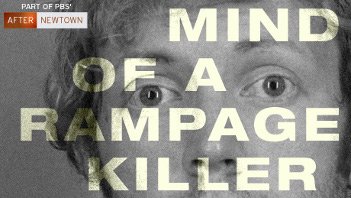We Need to Talk About Gun Laws
October 2nd marked the 45th school shooting the USA has seen in 2015. Ten students lost their lives, and nine others were injured, at Umpqua Community College in Roseberg when a 26 year old gunman – who had been inspired by other shootings in the US that year – shot a group of students and teachers dead. The fact that this is the forty-fifth school shooting this year is enough to raise the question: why hasn’t America banned guns yet? The bigger question, however, is why hasn’t America followed Australia’s lead?
The 2002 Monash University shooting saw a tight restriction on firearms across Australia, and there has not been a single reported school shooting since. Anyone who has read any arguments on anything to do with guns will know it’s an old rhetoric. Last week, Twitter had a number of suggestions to the alternative to banning guns. Most of them were terrible. Realistically, none of them were going to make much difference on their own. Australia has already proven that enforcing strict gun laws ensures innocent children aren’t slaughtered in their schools, and yet, many seem to think that banning guns outright is simply not the answer.
Let’s take a look at what the Second Amendment of the American Constitution actually states:
A well regulated Militia, being necessary to the security of a free State, the right of the people to keep and bear Arms, shall not be infringed.
Pretty clear, right?
 However, last year an article in the Washington Post clarified that the Second Amendment was probably just badly worded, and that it actually only covered the rights of American people within the Militia to bear arms – and not the rights of the people as a whole. This article states that the simple addition of five extra words, clarifying the actual ‘rights’ of the American people in relation to guns, could lead to the start of tighter of gun control.
However, last year an article in the Washington Post clarified that the Second Amendment was probably just badly worded, and that it actually only covered the rights of American people within the Militia to bear arms – and not the rights of the people as a whole. This article states that the simple addition of five extra words, clarifying the actual ‘rights’ of the American people in relation to guns, could lead to the start of tighter of gun control.
As a whole, there are a number of things the American government could do to try and crack down on gun crime – or even on mass shootings. It’s widely understood that the majority of shootings occur when people obtain access to guns that don’t belong to them. The availability of illegally obtained guns is a major contributing factor to the current issue, so perhaps the introduction of gun centres across America could provide somewhat of a solution.
For a window of time, people would be free to drop off any illegally obtained guns – without any repercussions – and following that window, the US police would be – with reasonable permit – able to search the homes of anyone they suspected to be harboring stolen or illegal arms. It could work in the same way police can search the home of somebody suspected of possessing drugs, except in this case, the contraband has the potential to be linked to the mass murder of several kids.
Sure, that’s not a perfect solution – but it’s probably a damn sight better than some of the others suggestions I’ve seen online. Potentially the most problematic is the suggestion that, rather than banning guns, schools should post armed guards in front of school buildings.
Take a second, if you will, to imagine yourself aged twelve, walking to school and seeing a policeman with a gun, ready and willing to shoot anyone they suspect of bearing a gun or any other weapon. Consider, if you can, how many ‘accidental’ shootings would occur in schools where a guard mistakenly thought a child was armed. Imagine the opportunities for racial attacks. That is not, in my opinion, even the beginnings of an answer to any sort of problem.
 And if that last ‘solution’ was potentially problematic, the other ‘solution’ I saw was bordering on ludicrous.
And if that last ‘solution’ was potentially problematic, the other ‘solution’ I saw was bordering on ludicrous.
Countless people, newspapers, and media outlets are actually calling for mental illness screening.
Mental. Illness. Screening.
Not, of course, to helping the people suffering with a mental illness – but rather, to deny them a currently closely-guarded Constitutional right. While it is evident that I do not agree with the US’s current gun laws, I would tend to agree even less with the prospect of awarding people who are ill with less rights than well people. In any given year, approximately 14.8 million Americans are suffering from depression. Depression is one of the biggest killers in the world. To deprive someone of a right due to their brain chemistry is as discriminatory as refusing to give someone a gun based on the colour of their skin.
Figuring out how this ‘solution’ could even be carried out is also problematic. If we were to take someone who, for example, is a psychopath, and presented them with a diagnostic questionnaire which they must complete in order to purchase a gun, all they would have to do is search online to find the sort of responses deemed appropriate in order to get the green light to be allowed to purchase said gun. If one was to instill a blanket ban on anyone with any sort of mental illness, the same process would ultimately fail.
Similarly, an individual may pass this ludicrous screening process, but members of their family, or their friends, may not. In an interview, the father of the UCC shooter spoke about how his son had amassed 13 guns to carry out his attack. Speaking on CNN, he said:
Look all over the world. You don’t see these kind of mass shootings all over the world on a consistent basis like you do in the United States. So somebody has to ask the question: How is it so easy to get all of these guns? 13 guns? (…) How was he able to compile that kind of arsenal?
Thirteen guns. It’s obvious that testing and screening for mental illness would be ultimately ineffectual if those that possess the guns in the first place aren’t even able to keep them safe. This same interview also emphasises the father’s disgust concerning the fact that there even is a Constitutional right to bear arms – pointing out that the ‘right to bear arms’ literally translates to the ‘right to kill people.’
 A Netflix documentary called Mind of a Rampage Killer very clearly establishes that many school shooting killers were kids that had been bullied, or suffered from depression or other mental illness. Andy Williams, the culprit behind the Santana High School shooting, spoke in the documentary of how his plan was to die by suicide by cop. He did not actually expect any other kids to die when he carried out the act.
A Netflix documentary called Mind of a Rampage Killer very clearly establishes that many school shooting killers were kids that had been bullied, or suffered from depression or other mental illness. Andy Williams, the culprit behind the Santana High School shooting, spoke in the documentary of how his plan was to die by suicide by cop. He did not actually expect any other kids to die when he carried out the act.
While this certainly does not excuse the actions of people who carry out shootings, it does prove that if these kids did not have access to guns, these tragedies wouldn’t be happening. Perhaps in the grand scheme of things, introducing higher gun taxes to people who own them, and implementing a ban on certain types of guns, could generate enough revenue to improve the state of mental healthcare across the USA. That, at least, would reduce the country’s current stigma surrounding mental health, that has only increased due to the US’s reluctance to tackle their gun control issue head on.
The old adage is that guns don’t kill people, people kill people – but people without guns are a lot less able to kill anyone.
Images via yellowhammernews.com
cdh2a.com
theguardian.com
pbs.org
